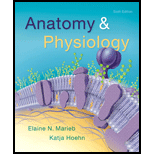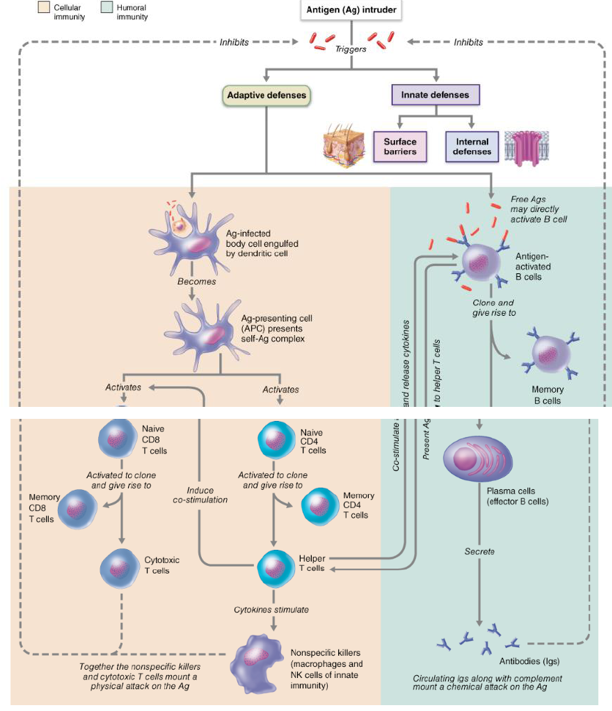
Anatomy & Physiology (6th Edition)
6th Edition
ISBN: 9780134156415
Author: Elaine N. Marieb, Katja N. Hoehn
Publisher: PEARSON
expand_more
expand_more
format_list_bulleted
Concept explainers
Textbook Question
Chapter 20.6, Problem 20CYU
Describe the killing mechanism of cytotoxic T cells that involves perforins.

Figure 20.20 Simplified summary of the primary immune response.
Co-stimulation usually requires direct cell-cell interactions; cytokines enhance these and many other events. Although complement, NK cells, and phagocytes are innate defenses, they are enlisted in the fight by cytokines. (For simplicity, only B cell receptors are illustrated.)
Expert Solution & Answer
Want to see the full answer?
Check out a sample textbook solution
Students have asked these similar questions
↑
LED
Tt O
Tt e 0 ✓
B
>
FLORES DIology Second Semester Review
7. Chi Square Analysis: wild dumpy male x ebony wild female
F1:
All wild wild
F2:
142 wild wild males
52 wild ebony males
46 dumpy wild males
17 dumpy ebony males
151 wild wild females
47 wild ebony females
51 dumpy wild females
8 dumpy ebony females
What pattern of inheritance is observed for body color?
Autosomal recessive
Autosomal dominant
Sex-linked recessive
Sex-linked dominant
What are the genotypes of the parents in the P generation?
a.
XBYdd x XbXbDD
b. Bbdd x bbDd
c. BBdd x bbDD
d. BBX Y x bbXDY
How many flies in the F2 generation would you expect to express the dumpy wild phenotype?
a.
289.125
b. 97
c. 96.375
d. 293
4. This question focuses on entrainment.
a. What is entrainment?
b. What environmental cues are involved in entrainment, and which one is most influential?
c. Why is entrainment necessary?
d. Assuming that a flash of darkness is an effective zeitgeber, what impact on circadian
rhythms would you expect to result from an event such as the 2024 solar eclipse (assume
it was viewed from Carbondale IL, where totality occurred at about 2 pm)? Explain your
reasoning. You may wish to consult this phase response diagram.
Phase Shift (Hours)
Delay Zone
Advance Zone
Dawn
Mid-day
Dusk
Night
Dawn
Time of Light Stimulus
e. Finally, give a real-world example of how knowledge of circadian rhythms and
entrainment has implications for human health and wellbeing or conservation biology.
This example could be from your reading or from things discussed in class.
Generate one question that requires a Punnet Squre to solve the question. Then show how you calculate the possibilities of genotype and phenotype
Chapter 20 Solutions
Anatomy & Physiology (6th Edition)
Ch. 20.1 - What distinguishes the innate defense system from...Ch. 20.1 - What is the first line of defense against disease?Ch. 20.2 - What is opsonization and how does it help...Ch. 20.2 - Under what circumstances might NK cells kill our...Ch. 20.2 - What are the cardinal signs of inflammation and...Ch. 20.3 - Name three key characteristics of adaptive...Ch. 20.3 - What is the difference between a complete antigen...Ch. 20.3 - What marks a cell as self as opposed to nonselfCh. 20.4 - What event (or observation) signals that a B or T...Ch. 20.4 - Which of the following T cells would survive...
Ch. 20.4 - Prob. 11CYUCh. 20.4 - In clonal selection, who does the selecting? What...Ch. 20.5 - Why is the secondary response to an antigen so...Ch. 20.5 - Prob. 14CYUCh. 20.5 - Which class of antibody is most abundant in blood?...Ch. 20.5 - List four ways in which antibodies can bring about...Ch. 20.5 - Prob. 17CYUCh. 20.6 - Class II MHC proteins display what kind of...Ch. 20.6 - Which type of T cell is the most important in both...Ch. 20.6 - Describe the killing mechanism of cytotoxic T...Ch. 20.7 - Prob. 21CYUCh. 20.7 - Prob. 22CYUCh. 20 - All of the following are considered innate body...Ch. 20 - The process by which neutrophils squeeze through...Ch. 20 - Antibodies released by plasma cells are involved...Ch. 20 - Which of the following antibodies can fix...Ch. 20 - Which antibody class is abundant in body...Ch. 20 - Small molecules that must combine with large...Ch. 20 - Lymphocytes that develop immunocompetence in the...Ch. 20 - Cells that can directly attack target cells...Ch. 20 - Prob. 9MCCh. 20 - The cell type most often invaded by HIV is a(n)...Ch. 20 - Complement fixation promotes all of the following...Ch. 20 - Using the letters from column B, match the cell...Ch. 20 - Besides acting as mechanical barriers, the skin...Ch. 20 - Explain why attempts at phagocytosis are not...Ch. 20 - What is complement? How does it cause bacterial...Ch. 20 - Interferons are referred to as antiviral proteins....Ch. 20 - Differentiate between humoral and cellular...Ch. 20 - Although the adaptive immune system has two arms,...Ch. 20 - Define immunocompetence and self-tolerance. How is...Ch. 20 - Differentiate between a primary and a secondary...Ch. 20 - Prob. 21SAQCh. 20 - What is the role of the variable regions of an...Ch. 20 - Name the five antibody classes and describe where...Ch. 20 - How do antibodies help defend the body?Ch. 20 - Do vaccines produce active or passive humoral...Ch. 20 - Prob. 26SAQCh. 20 - Describe the specific roles of helper, regulatory,...Ch. 20 - Prob. 28SAQCh. 20 - Prob. 29SAQCh. 20 - What events can result in autoimmune disease?Ch. 20 - Prob. 1CCSCh. 20 - Prob. 2CCSCh. 20 - Prob. 3CCSCh. 20 - Prob. 4CCSCh. 20 - Remember Mr. Ayers, the bus driver from Chapter...
Knowledge Booster
Learn more about
Need a deep-dive on the concept behind this application? Look no further. Learn more about this topic, biology and related others by exploring similar questions and additional content below.Similar questions
- Briefly state the physical meaning of the electrocapillary equation (Lippman equation).arrow_forwardExplain in a small summary how: What genetic information can be obtained from a Punnet square? What genetic information cannot be determined from a Punnet square? Why might a Punnet Square be beneficial to understanding genetics/inheritance?arrow_forwardIn a small summary write down:arrow_forward
- Not part of a graded assignment, from a past midtermarrow_forwardNoggin mutation: The mouse, one of the phenotypic consequences of Noggin mutationis mispatterning of the spinal cord, in the posterior region of the mouse embryo, suchthat in the hindlimb region the more ventral fates are lost, and the dorsal Pax3 domain isexpanded. (this experiment is not in the lectures).a. Hypothesis for why: What would be your hypothesis for why the ventral fatesare lost and dorsal fates expanded? Include in your answer the words notochord,BMP, SHH and either (or both of) surface ectoderm or lateral plate mesodermarrow_forwardNot part of a graded assignment, from a past midtermarrow_forward
arrow_back_ios
SEE MORE QUESTIONS
arrow_forward_ios
Recommended textbooks for you
 Human Physiology: From Cells to Systems (MindTap ...BiologyISBN:9781285866932Author:Lauralee SherwoodPublisher:Cengage Learning
Human Physiology: From Cells to Systems (MindTap ...BiologyISBN:9781285866932Author:Lauralee SherwoodPublisher:Cengage Learning Biology 2eBiologyISBN:9781947172517Author:Matthew Douglas, Jung Choi, Mary Ann ClarkPublisher:OpenStax
Biology 2eBiologyISBN:9781947172517Author:Matthew Douglas, Jung Choi, Mary Ann ClarkPublisher:OpenStax Human Heredity: Principles and Issues (MindTap Co...BiologyISBN:9781305251052Author:Michael CummingsPublisher:Cengage Learning
Human Heredity: Principles and Issues (MindTap Co...BiologyISBN:9781305251052Author:Michael CummingsPublisher:Cengage Learning Human Biology (MindTap Course List)BiologyISBN:9781305112100Author:Cecie Starr, Beverly McMillanPublisher:Cengage Learning
Human Biology (MindTap Course List)BiologyISBN:9781305112100Author:Cecie Starr, Beverly McMillanPublisher:Cengage Learning Biology (MindTap Course List)BiologyISBN:9781337392938Author:Eldra Solomon, Charles Martin, Diana W. Martin, Linda R. BergPublisher:Cengage Learning
Biology (MindTap Course List)BiologyISBN:9781337392938Author:Eldra Solomon, Charles Martin, Diana W. Martin, Linda R. BergPublisher:Cengage Learning

Human Physiology: From Cells to Systems (MindTap ...
Biology
ISBN:9781285866932
Author:Lauralee Sherwood
Publisher:Cengage Learning

Biology 2e
Biology
ISBN:9781947172517
Author:Matthew Douglas, Jung Choi, Mary Ann Clark
Publisher:OpenStax

Human Heredity: Principles and Issues (MindTap Co...
Biology
ISBN:9781305251052
Author:Michael Cummings
Publisher:Cengage Learning

Human Biology (MindTap Course List)
Biology
ISBN:9781305112100
Author:Cecie Starr, Beverly McMillan
Publisher:Cengage Learning

Biology (MindTap Course List)
Biology
ISBN:9781337392938
Author:Eldra Solomon, Charles Martin, Diana W. Martin, Linda R. Berg
Publisher:Cengage Learning

Immune System and Immune Response Animation; Author: Medical Sciences Animations;https://www.youtube.com/watch?v=JDdbUBXPKc4;License: Standard YouTube License, CC-BY
Immune response: summary; Author: Dr Bhavsar Biology;https://www.youtube.com/watch?v=ADANgHkX4OY;License: Standard Youtube License